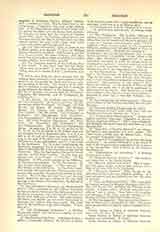

Gallicanus, SAINTS.—The following saints of this name are commemorated on June 25:—
GALLICANUS, Saint, Roman Martyr in Egypt, 362-363, under Julian. According to his Acts (in “Acta SS.”, June, VII, 31), which are not very reliable, he was a distinguished general in the war against the Persians, was consul with Symmachus, 330 (perhaps also once before with Bassus, 317). After his conversion to Christianity he retired to Ostia, founded a hospital and endowed a church built by Constantine. Under Julian he was banished to Egypt, and lived with the hermits in the desert. A small church was built in his honor in the Trastevere of Rome. His relics are at Rome in the church of Sant’ Andrea della Valle. The legend of his conversion was dramatized by Roswitha.
GALLICANUS I, Saint, seventh Bishop of Embrun, was represented at the Fourth Council of Arles in 524, assisted in person at that of Carpentras in 527; perhaps also at the Second Council of Orange in 529, and at the Third Council of Vaison in the same year.
GALLICANUS II, Saint, ninth Bishop of Embrun, assisted at the Fourth Council of Orleans, 541, and was represented by Probus at the fifth of Orleans. He is said to have consecrated the church of the Spanish martyrs Vincent, Orontius, and Victor, built at Embrun by Palladius. It is probable, however, that Palladius never existed (he is not known except from some hagiographical documents of little value), and that Gallicanus governed the diocese from 518 to 549 and perhaps until 554.
FRANCIS MERSHMAN

